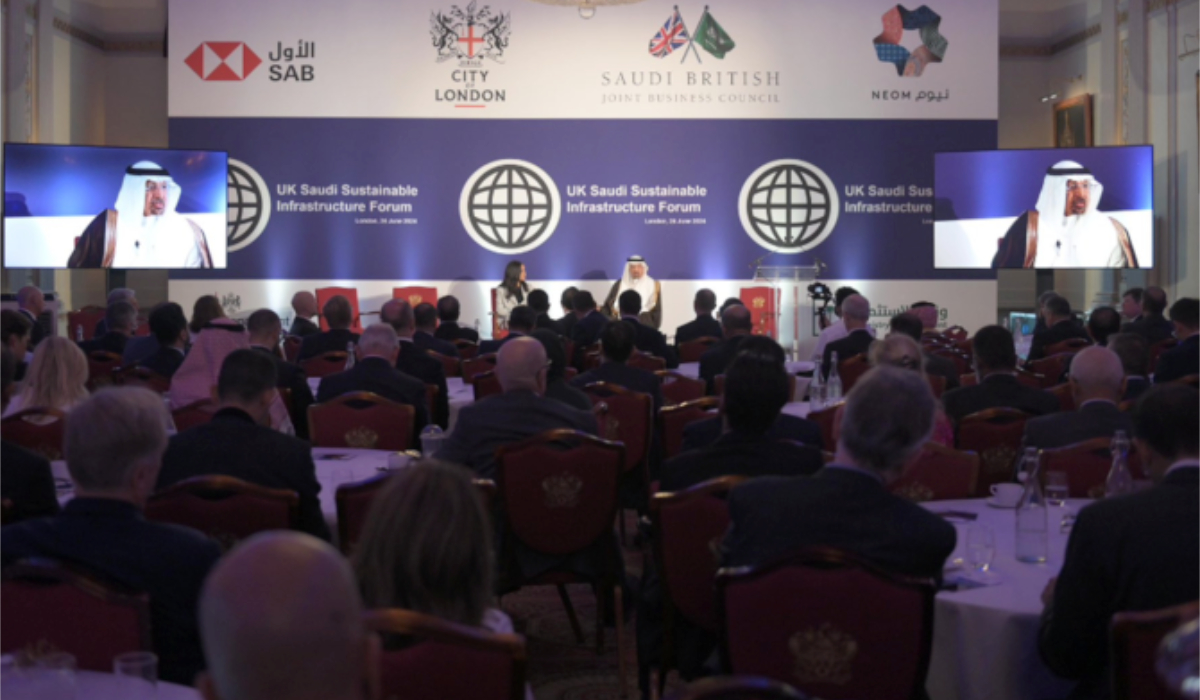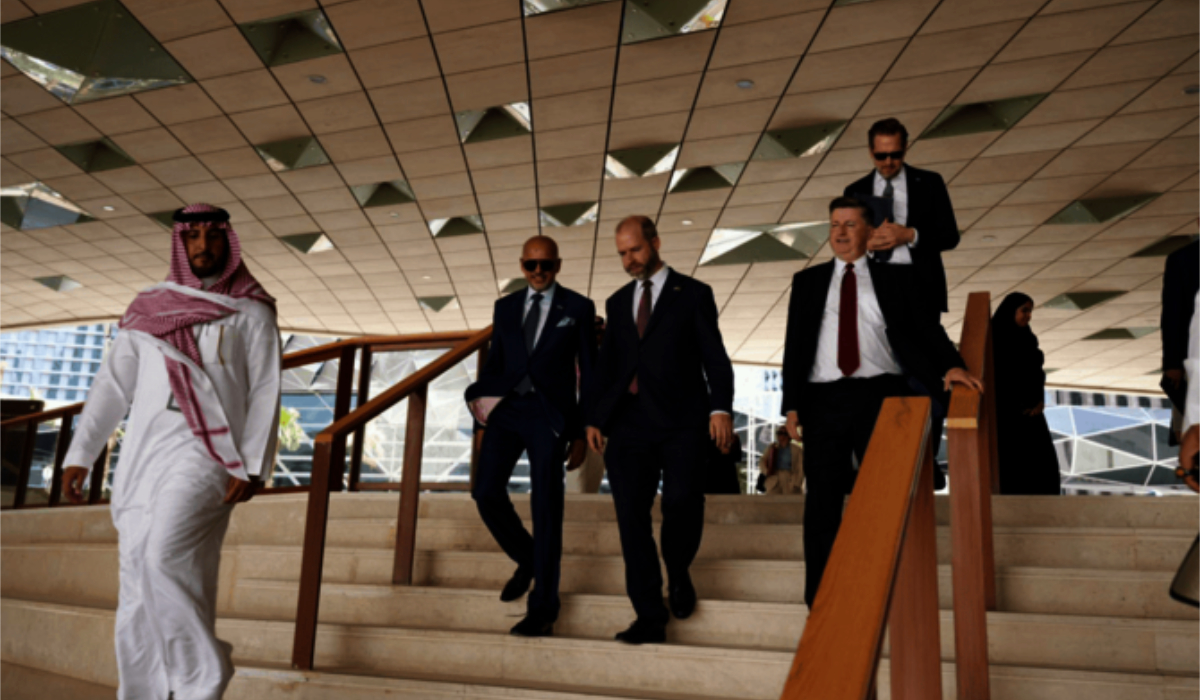RIYADH: Ahead of UK Prime Minister Keir Starmer’s official visit to the Kingdom, Arab News reviews recent bilateral developments between the two kingdoms.
Forging alliances that transcend borders, Saudi Arabia and the UK have emerged as powerhouses of collaboration, driving innovation and reshaping global landscapes in the fields of energy, technology, and sustainable infrastructure.
In 2018, the two kingdoms established the annual UK-Saudi Strategic Partnership Council as a central platform to discuss and enhance all aspects of their bilateral relationship, including UK support for Saudi Arabia’s Vision 2030 in various sectors.

Saudi Arabia’s Minister of Education Yousef Al-Benyan participated in roundtable meetings involving representatives from the Kingdom and British universities. (SPA)
According to Saudi Minister of Commerce Majid Al-Qasabi, bilateral trade between the two countries has surged by more than a third since 2018, exceeding $99.12 billion in value.
“The growth and the inflow of trade are matched by the growth in foreign direct investment. In 2022 alone, the inflow of British investment into (the) Saudi economy reached more than $5.4 billion,” Al-Qasabi said.
With more than 1,100 active licenses for UK investors, developments such as the gigaprojects in Saudi Arabia and policy reforms are strengthening business opportunities in the Kingdom.
FASTFACTS
• With more than 1,100 active licenses for UK investors, developments such as the gigaprojects in Saudi Arabia and policy reforms are strengthening business opportunities in the Kingdom.
• UK cleantech leader Carbon Clean is also collaborating with Saudi Aramco, creating 2,000 jobs in the UK.
• The countries have deepened their collaboration on sustainable infrastructure through the UK-Saudi Sustainable Infrastructure Summit, held on June 24 in London.
The UK is emerging as Saudi Arabia’s second-largest investor, accumulating approximately $16 billion in investment stock, said Saudi Minister of Investment Khalid Al-Falih at the Great Futures Initiative Conference in May.
The conference reflected the efforts of both countries to enhance and expand their economic partnership. It saw the attendance of 2,200 economic stakeholders from both Saudi Arabia and the UK, including about 450 British business owners.

The Lord Mayor of the City of London Alderman said that Saudi Arabia is investing more in infrastructure than any other country in the Middle East region, including in 14 new giga-projects. (X @MISA)
During the conference, more than 20 bilateral ministerial meetings were held, 13 agreements were signed, and ways to develop cooperation in 13 economic fields were discussed, including tourism, culture, education, health, sports, investment, trade, and financial services.
Saudi Arabia’s investment landscape is particularly attractive to British businesses, with 52 UK companies selecting the country as their regional headquarters out of the 400 global multinational companies that have established hubs there.
Defense cooperation between the two countries is a crucial aspect of their bilateral relationship.

Saudi and British defense ministers discuss strengthening military ties and addressing regional security challenges. (X @JReynoldsMP)
Talks in November between Saudi and British defense ministers focused on strengthening military ties and addressing regional security challenges.
Prince Khalid bin Salman and John Healey discussed the Saudi-British strategic partnership and explored ways to strengthen defense cooperation.
“We also discussed our joint efforts to address regional challenges and our shared vision to promote security and stability on both regional and international levels,” Prince Khalid said.
These discussions emphasized the importance of maintaining stability in the Middle East while exploring new avenues for defense technology collaboration.
At the Great Futures Conference in May, CEO of the Health Sector Transformation Program Dr. Khalid Al-Shaibani, said: “In Saudi Arabia, we have embraced digital health as a priority because of its potential to enhance healthcare delivery, improve patient outcomes, and drive economic growth.”
Al-Shaibani added that by integrating health, equity, and sustainability into all decision-making processes, Saudi Arabia fosters an environment that promotes the well-being of its citizens.
The partnership between the countries has expanded into cutting-edge technological domains, with particular emphasis on artificial intelligence and healthcare innovation.
UK-based Proximie, a technology company specializing in surgical collaboration solutions, has been working to establish strategic partnerships in Saudi Arabia, highlighting the growing technological cooperation between the two nations.
With $80 million in funding, Proximie is strengthening its presence in Saudi Arabia through strategic partnerships aimed at supporting the country’s healthcare system.
The company uses virtual surgery technology, AI, and real-time connectivity to enhance healthcare delivery and reduce inequities in medical access.
Education remains a cornerstone of Saudi-UK relations, with approximately 14,000 Saudi students pursuing higher education in the UK during the academic years 2020-2023.
To leverage their expertise, both countries agreed to collaborate in the field of education, particularly to support the development of early-stage education.
A memorandum of understanding was signed to facilitate this partnership, focusing on improving teaching methodologies and capacity building.
Saudi Arabia’s Minister of Education Yousef Al-Benyan made a statement late in 2023 that the educational partnership with the UK aims to increase the participation of the British private education sector in Saudi education.
This includes establishing British schools and universities, addressing skills gaps, training healthcare professionals, and supporting the development of education in line with the ambition of the Kingdom’s Vision 2030.
“Our strategic partnership focuses on six main areas, which include building a stronger and deeper partnership in the field of education; supporting the professional development of Saudi educators and enhancing their knowledge, skills, and abilities,” Al-Benyan said. “… as well as enhancing cooperation and partnerships in the field of university education, including research cooperation, student scholarships, and transnational education.”
Plans are underway to establish 10 British schools in the Kingdom by 2030, further strengthening educational ties between the two countries.
In September, the two countries tackled the stimulation and financing of emerging companies in promising fields based on research and innovation.
This falls in line with the two countries’ target to increase bilateral trade to $39.6 billion by 2030.
Jobs will be boosted in the north of England after the launch on Monday of the world-first new graphene-enriched carbon fibre plant project in Saudi Arabia.
UK company Graphene Innovation Manchester on Dec. 9 announced the launch of the world’s first commercial production of graphene-enriched carbon fibre with Saudi Arabia’s NEOM — a step forward in environmentally sustainable advanced materials.
The project aims to generate $319 million of investment into a research and innovation hub in Greater Manchester and is expected to create more than 1,000 skilled jobs in the region.
Prior to his upcoming visit to Saudi Arabia, Starmer said in a statement: “Further boosting the green energy relationship between the UK and Saudi Arabia, Oxford-based private equity fund HYCAP is supporting Saudi Arabia’s plans to reach net zero emissions by 2060 by investing £785 million to develop hydrogen mobility clusters in Northern Ireland and across the UK.”
The project will deliver hydrogen buses, trucks, critical components, and other elements of hydrogen production and distribution while removing more than 25 million tonnes of transport-related CO2 over the lifetime of the project.
Ed Miliband, the UK secretary of state for energy security and net zero, said: “Clean energy can be the source of the jobs of the future ... these new investments and partnerships will deliver new jobs in new industries, boosting our country’s energy independence and economic growth.”
The UK and Saudi Arabia will also establish a Joint International Institute for Clean Hydrogen, featuring Newcastle University and other British and Saudi universities, to develop state-of-the-art expertise and skills in clean energy.
UK cleantech leader Carbon Clean is also collaborating with Saudi Aramco to develop modular carbon capture technology, creating 2,000 jobs in the UK.
Sustainable Cement Company and Saudi City Cement Company will drive $255 million in sustainable concrete production investment.
Furthermore, Saudi Arabia and the UK have deepened their collaboration on sustainable infrastructure through the UK-Saudi Sustainable Infrastructure Summit, held on June 24 in London.
The summit provided a platform for adopting and exchanging knowledge gained from Vision 2030, forming a global model for cooperation in sustainable development.
Building on their 2022 green finance agreement, the summit presented Saudi Arabia’s Vision 2030 ambitions, including reducing carbon emissions by 278 million tonnes annually by 2030 and increasing renewable energy capacity by 50 percent.
Former Lord Mayor of the City of London Michael Mainelli said that Saudi Arabia is investing more in infrastructure than any other country in the Middle East region, including in 14 new gigaprojects.
He said: “This investment, combined with the City of London’s expertise and leadership in sustainable finance, can set a global template for sustainable development.”
The country’s focus on sectors historically characterized by underinvestment, while addressing global challenges such as energy transition and technological advancement, creates natural synergies for collaboration with UK businesses.
Tourism cooperation between the two countries has seen significant development in recent years, exemplified by the signing of a Joint Statement of Intent between the Saudi Tourism Authority and Visit Britain to enhance cooperation and exchange expertise.
The Kingdom has become a destination for British tourists, hosting more than 165,000 visitors from the UK in the first quarter of 2024 and issuing over 560,000 electronic visas.
The Kingdom and the UK also share strong educational and cultural ties, with approximately 14,000 Saudi students studying in British universities.
The University of Strathclyde plans to become the first British university to establish a branch in the Kingdom in collaboration with Princess Nourah bint Abdulrahman University.
As both countries work toward their respective strategic goals, the relationship is expected to strengthen further in other sectors, creating new opportunities for collaboration and mutual benefit.



























